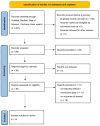Role of Gut Microbiota and Metabolomics in Predicting Response to Vedolizumab in Inflammatory Bowel Disease: A Systematic Review
- PMID: 40284471
- PMCID: PMC12029995
- DOI: 10.3390/pharmaceutics17040476
Role of Gut Microbiota and Metabolomics in Predicting Response to Vedolizumab in Inflammatory Bowel Disease: A Systematic Review
Abstract
Background: This review explores the impact of gut microbiota profiles in predicting the response to anti-integrin biologic therapy, particularly vedolizumab, in inflammatory bowel disease (IBD) patients. IBD, encompassing Crohn's disease and ulcerative colitis, is a chronic inflammatory condition with a growing prevalence linked to industrialization and lifestyle changes. Disruption in the gut microbiota balance, characterized by reduced diversity and altered short-chain fatty acid (SCFA) production, is associated with IBD and its symptoms. Current pharmacological treatments target healing and remission, with vedolizumab offering a gut-selective treatment approach. Methods: A search of the literature was performed on the relationship between anti-integrin treatment and the microbiome profile in IBD. Articles were examined from the PubMed, Medline, Cochrane, and Web of Science databases. Results: This review identified five human studies investigating the relationship between gut microbiome composition, SCFAs, and response to vedolizumab, revealing an increased abundance of beneficial bacteria and levels of SCFAs like butyrate in remission cases. Despite promising findings, the small sample sizes and limited scope of the existing studies highlight the need for larger, comprehensive research. Conclusions: This review underscores the potential of gut microbiome and metabolite profiling as non-invasive biomarkers for IBD severity and treatment outcomes, advocating for personalized therapeutic strategies to enhance efficacy. The insights gained could lead to novel diagnostic and treatment modalities, although further validation is necessary to fully understand the intricate connections between gut microbiota and IBD prognosis.
Keywords: Crohn’s disease; gut microbiota; inflammatory bowel disease; short-chain fatty acids; ulcerative colitis; vedolizumab.
Conflict of interest statement
The authors declare no conflicts of interest.
References
-
- Ng S.C., Shi H.Y., Hamidi N., Underwood F.E., Tang W., Benchimol E.I., Panaccione R., Ghosh S., Wu J.C.Y., Chan F.K.L., et al. Worldwide incidence and prevalence of inflammatory bowel disease in the 21st century: A systematic review of population-based studies. Lancet. 2017;390:2769–2778. doi: 10.1016/S0140-6736(17)32448-0. - DOI - PubMed
Publication types
LinkOut - more resources
Full Text Sources


